
The transition to alternative fuels
The shift towards alternative fuels is driven by a combination of environmental, economic and social factors, as industries strive for energy solutions that are both sustainable and resilient. Technological advancements, regulatory environments and market dynamics are presently the primary factors limiting the transition to alternative fuels. However, as sustainability is increasingly prioritised by businesses and governments, this transition is accelerating, particularly in sectors like transportation, manufacturing, mining and heavy industries. Hydrogen, along with its derivatives like Ammonia or synthetic Methane, Biofuels such as Methanol and SAF, and Methane Hydrates are prominent examples of alternatives to conventional non-renewable sources.

How we can help your business
STEREGY provides services for conducting feasibility studies and developing the technology tailored to the adoption of sustainable fuels for your specific application. The subsequent examples highlight the studies in which our team has gained significant expertise.
Analysis of shipping costs and expenses linked to greenhouse gas emissions abatement for merchant vessels operating on green hydrogen, ammonia, methanol, natural gas and battery power
Analysis of the levelised costs of electricity generated by hybrid plants equipped with hydrogen, natural gas and Diesel fuelled gensets
Techno-economics of light-duty vehicles operating on various near-zero emissions energy vectors and their impact on the fleet performance
Combustion and detailed kinetic analyses of green hydrogen, methane, ammonia and alcohols in advanced combustion engines
Development and demonstration of near-zero emissions combustion engines operating on alternative fuels, e.g. MW-scale hydrogen-fuelled genset for power generation

